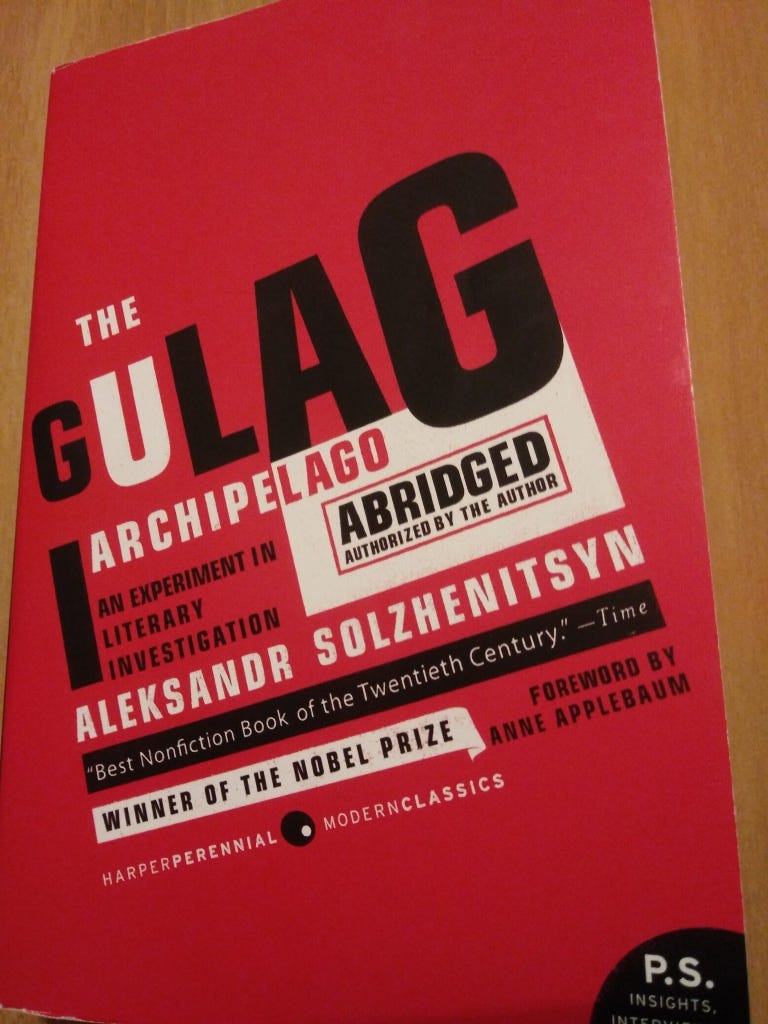The Gulag Archipelago documents and examines the horrors of the Soviet prison camps. It’s the Russian literature equivalent of historical nonfiction. Comparing it to a traditional history book is like comparing War and Peace or The Brothers Karamazov to a traditional novel.
Written by Aleksandr Solzhenitsyn (a survivor of the gulags), even the abridged version is a sprawling, epic work. The author compiles not only his own experiences but those of many others to paint a thorough portrait of the oppressive atmosphere permeating Russia in the early to mid-20th century. He drills into the psyches of prisoners as well as guards, elevating the book into an insightful study of human nature.
I admit, I read only the abridged version, and I had to start and stop a few times to break it up with some lighter fare. The prose isn’t difficult to read at all, but the subject matter is intense.
Obviously, this book is not entertainment, but it’s worth the effort. And remembering the broader story of 20th-century Russia, a historic tragedy in which millions died and many more suffered, is important.
Ruled by the nearly 300-year-old Romanov dynasty, Russia began the century behind the times and in serious need of reform. But when revolution finally happened, conditions worsened and atrocities commenced. The Gulag Archipelago is a good starting point for learning how, and it can help us temper our righteous desire for change with the appropriate humility and caution.
The book has tons of excellent quotes. Here’s just a small sampling:
Power is a poison well known for thousands of years. If only no one were ever to acquire material power over others! But to the human being who has faith in some force that holds dominion over all of us, and who is therefore conscious of his own limitations, power is not necessarily fatal. For those, however, who are unaware of any higher sphere, it is a deadly poison. For them there is no antidote.
***
So let the reader who expects this book to be a political expose slam its covers shut right now.
If only it were all so simple! If only there were evil people somewhere committing evil deeds, and it were necessary only to separate them from the rest of us and destroy them. But the line dividing good and evil cuts through the heart of every human being. And who is willing to destroy a piece of his own heart?
***
Ideology—that is what gives evildoing its long-sought justification and gives the evildoer the necessary steadfastness and determination. That is the social theory which helps to make his acts seem good instead of bad in his own and others’ eyes, so that he won’t hear reproaches and curses but will receive praise and honors.
***
Unlimited power in the hands of limited people always leads to cruelty.
***
The permanent lie becomes the only safe form of existence, in the same way as betrayal. Every wag of the tongue can be overheard by someone, every facial expression observed by someone. Therefore every word, if it does not have to be a direct lie, is nonetheless obliged not to contradict the general, common lie. There exists a collection of ready-made phrases, of labels, a selection of ready-made lies.
***
Truth, it seems, is always bashful, easily reduced to silence by the too blatant encroachment of falsehood.
The prolonged absence of any free exchange of information within a country opens up a gulf of incomprehension between whole groups of the population, between millions and millions.
We simply cease to be a single people, for we speak, indeed, different languages.






